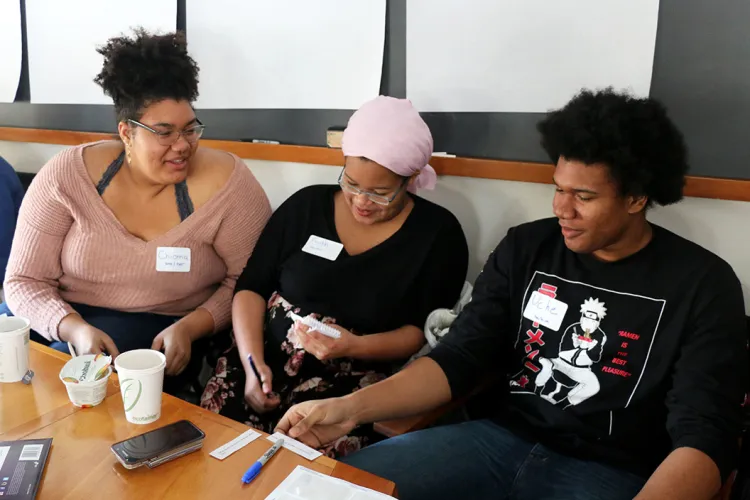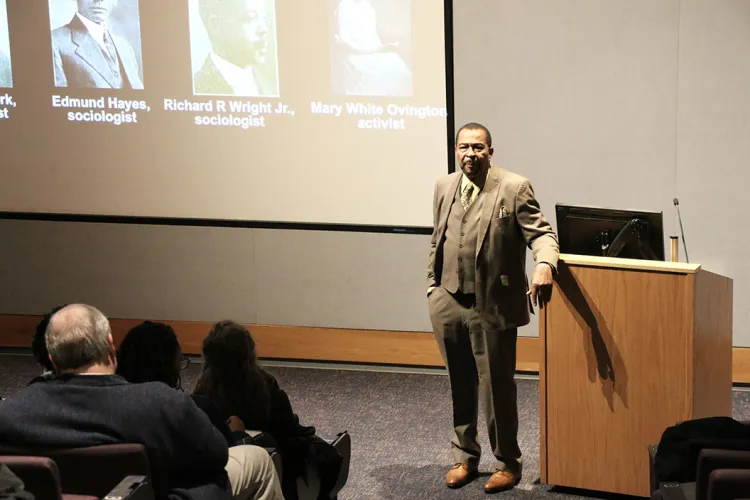Critical Conversations Symposium Opens Black History Month

W.E.B. Du Bois, a leading African-American scholar, introduced the concept of the “color line,” or the divide between races that serves to give white people more access to opportunity than black people.
Although recognizing how the color line breeds oppression can make people uncomfortable, members of the Swarthmore community gathered Saturday at the interactive Critical Conversations symposium to directly engage with one another about the effects of racial inequality and discrimination.
Hosted by the Sociology & Anthropology Department, the Black Studies Program, the William J. Cooper Foundation, and the Petrucci Family Foundation, the symposium served to honor Du Bois' spirit by promoting democratic voices and deep listening in conversations. It emphasized the need for mutual exchange and respect.
President Valerie Smith kicked off the symposium’s main activities in the cinema by reiterating the importance for Swarthmore to engage in difficult conversations, carrying out the precedent set by Du Bois.
“We’re eager to celebrate the 150th anniversary of W.E.B. Du Bois,” said Smith, “and to synthesize his story with the challenges that continue to face us, including the challenges of communication and persistent inequality.”
Aldon Morris, the Leon Forrest Professor of Sociology and African American Studies at Northwestern University, then provided the keynote address, drawing from his book The Scholar Denied: W.E.B. Du Bois and the Birth of Modern Sociology (2015). Morris is also known for his award-winning book, The Origins of the Civil Rights Movement (1984), which received the American Sociological Association Distinguished Contribution to Scholarship Award.
In his speech, Morris set a foundation for how the racial divide came into existence and how it manifests itself in today’s society. He connected how Du Bois’ work is an example of the color line in today’s society, since his sociology work is often marginalized in comparison to white scholars.

Aldon Morris of Northwestern University delivers the keynote speech at the Critical Conversations symposium.
“Du Bois was the first sociologist to theorize that people’s social position shaped their lived experiences,” Morris said.
“From this perspective, Du Bois identified the source of cultural creativity and organizational strength that enabled African-Americans to produce movements that liberated themselves.”
To translate the message of Morris’s keynote into tangible action on Swarthmore’s campus and beyond, participants divided into two small discussion groups to foster dialogue around these critical issues. Some questions the groups engaged with included how to cope with the large scale of racial inequality issues and how to balance fear of racial discrimination with action. The groups also discussed how to continue to engage younger generations in social movements.
The symposium concluded with a lunch that promoted a sense of collectiveness and reported back on some of the topics discussed in the small groups. Participants agreed on the importance of educating themselves and one another on racial inequality in order to create meaningful action. They exchanged texts to promote a foundational understanding of the racial divide, including The New Jim Crow (2010) by Michelle Alexander and Just Mercy (2014) by Bryan Stevenson. In line with the goals of the symposium, participants agreed that perhaps the biggest difference can be made through initiating difficult conversations and embracing new perspectives.
“Effective organizing comes through sustained engagement and deep listening,” says Assistant Professor of Sociology Nina Johnson, who helped organize the symposium. “Our hope is this conversation can be the start of us learning how to listen effectively across axes of difference to get to that better place.”
The Critical Conversations symposium is one in a series of Black History Month events meant to engage in conversations surrounding racial identity this February. Other events include the Black Cultural Center’s Black Film Series, panel discussions, and guest lectures which serve to honor the contributions and struggles of the black community.



